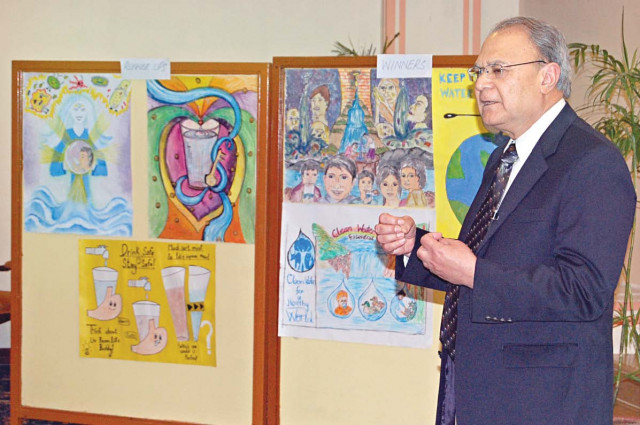Water disinfection: Using sunburn to your advantage
Pakistan lacks proper water treatment facility which why water-borne diseases are increasing.

Pakistan lacks a proper water treatment facility which is one of the major causes behind the increase in water-borne disease in the country. However the issue can be addressed with the help of the ample sunshine this region receives. These views were expressed by speakers at a poster contest on “Household Water Treatments”, organised by Sustainable Development Policy Institute (SDPI) and Swiss Agency for Development and Cooperation (SDC) at a local hotel on Friday. Students from various schools of the country participated in the event.
In case of floods and other disasters the acute problem of clean and safe drinking water exacerbates, the participants were told. The issue is a chronic one for the remote areas. However water supplied throughout the country becomes ‘unsafe’ for consumption in times of floods.
“Solar water disinfection — SODIS can help kill 99 per cent of microbes in contaminated water and make it safe to use for drinking purpose,” said Dr Shaukat Farooq from SHELADIA Associates.
“In a country like Pakistan we cannot be sure of the water we use, as there are very few treatment plants and these mainly remove turbidity from the water,” said Dr Farooq.
“Therefore, SODIS can be a method that could lower the number of ecoli and coliform — the disease causing bacteria in water — and hence many lives can be saved that are lost due to waterborne diseases,” he said.
Another alarming observation made by Dr Farooq was that people use waste water as clean drinking water due to lack of awareness.
“Water used by the cholera patient goes underground from where it gets mixed with waste water and then people use it for drinking purpose,” he added.
A skit, highlighting the issue and stressing the need for using clean drinking water, was also presented. The performance, however, failed to grab the attention of the audience, as it lacked focus.
Earlier a poster competition was also held in which Shehryar Khan of Beaconhouse School System, Hasan Asghar of Lahore Grammar School and Bisma Pervaiz of Beaconhouse School System won the first, second and third positions respectively.
Explaining about the programme and its objective, Momi Saleem, Research Associate and project head, told The Express Tribune, “SODIS is an easy way to make contaminated water clean for drinking purpose especially for those who do not have an access to clean drinking water or cannot afford to have it.” She stressed on using household treatments to get rid of water contamination.
To disinfect the contaminated water, it needs to be kept in a plastic bottle under the sun for at least six hours. “This water can later be stored in refrigerator or in ice slabs to cool down and be used for drinking purpose,” she said.
About the involvement of educational institutions in the programme, Momi Saleem, said that the poster competition was organised to engage the youth in raising awareness about alternative and cost-effective methods of water disinfection.
Published in The Express Tribune, March 19th, 2011.












1724319076-0/Untitled-design-(5)1724319076-0-208x130.webp)






COMMENTS
Comments are moderated and generally will be posted if they are on-topic and not abusive.
For more information, please see our Comments FAQ